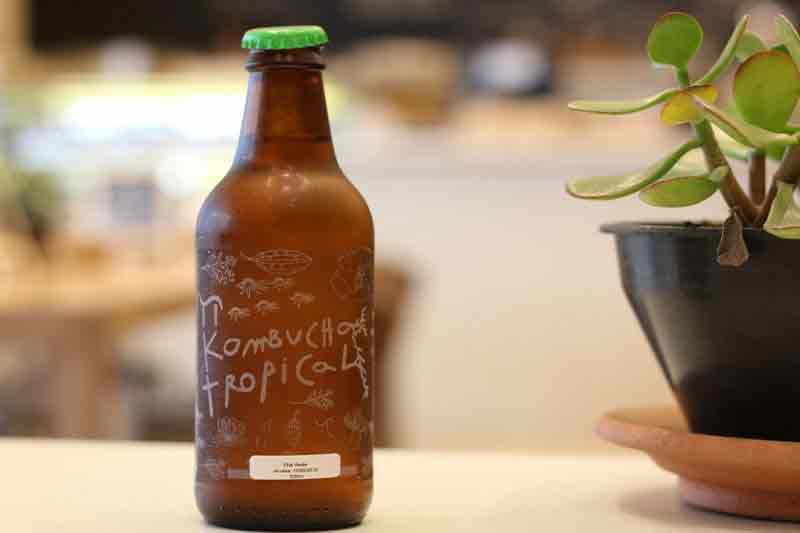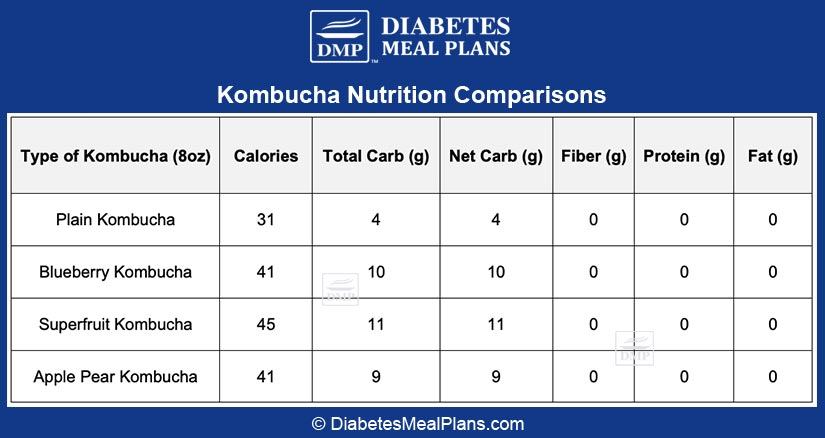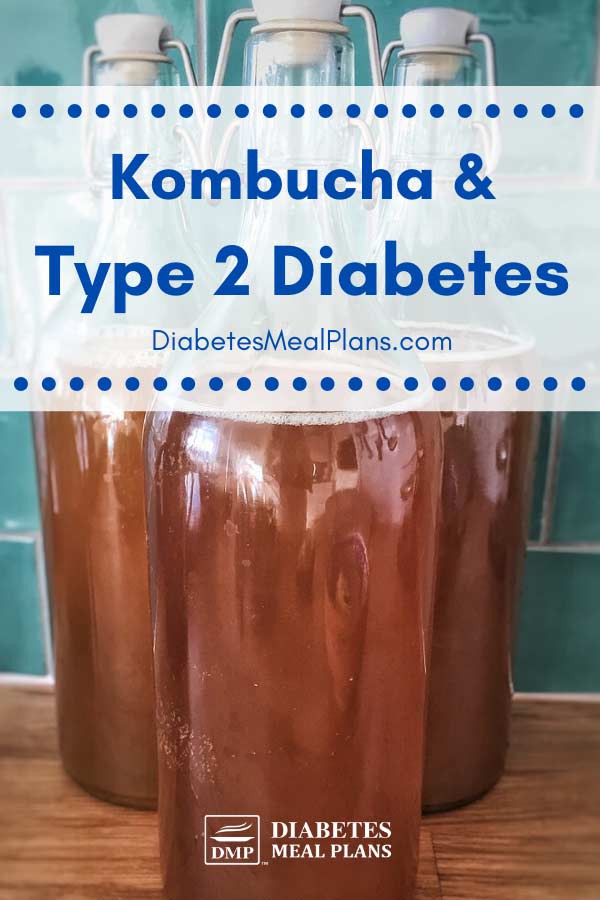Table of Contents[Hide][Show]
Kombucha has been the health-drink craze of the last decade or so, and there are plenty of reasons why. Beyond its fun, fizzy taste, kombucha boasts numerous health benefits like easing digestion, promoting positive gut bacteria, boosting the immune system, and improving heart health.
But which of these claims are backed by research? And more importantly, can folks with type 2 diabetes reap the benefits of kombucha without compromising their blood sugar stability?

What is Kombucha?
Kombucha is a drink that dates back thousands of years and finds its roots in civilizations such as ancient China and Eastern Europe. Nowadays, you may see glass bottles of kombucha lining the shelves of your local health food store or even your local gas station! So we know this drink is popular, but what exactly is it?
Kombucha is a product of the fermentation of black or green tea. To make it, you simply add a symbiotic culture of bacteria and yeast (SCOBY) to a solution of tea and sugar. The end result is a carbonated beverage with a sweet-tart flavor and a host of potential health benefits.
It contains some beneficial properties including antioxidants and probiotics. But is it okay for someone with diabetes to drink kombucha?
Kombucha Nutrition Facts
The nutrition facts for kombucha can be highly variable. It depends on how much sugar is added and what types of flavorings are used. Some brands use a mix of different teas, fruit juice, herbs, spices and even adaptogens in their beverages.
Kombucha contains some interesting properties. Most notably, since it is a fermented beverage, it is a source of probiotics. Probiotics are beneficial bacteria for our gut and can have a positive impact on our health. Making sure our gut has the right balance of good and bad bacteria can also help control blood glucose levels.
The fermentation process produces acetic acid (also found in vinegar) and several other acidic compounds, trace levels of alcohol, and gases that make it carbonated. It also produces small amounts of B vitamins.
Other beneficial compounds like polyphenols, which act as an antioxidant, can be found in kombucha since these are also found in green and black tea.
Kombucha Sugar Content
Now for what you really want to know…the sugar content!
All forms of kombucha must contain sugar because the sugar serves as food for the bacteria and yeast to eat. As the SCOBY (the bacteria culture) consumes the sugar, the tea ferments and the kombucha is created. The reality is that the sugar added to kombucha should ferment out. Meaning the sugar is meant for the SCOBY to eat, not for you!
The sugar content shown on a kombucha label (at least in the US) is reflective of the amount of sugar after fermentation has occurred. Technically, a product could continue to ferment and the sugar content would continue to decrease.
However, a 2016 study found that there were large discrepancies in the amount of sugar on the label versus what was actually in the product. So you can see how this may pose a problem for those with diabetes who really need to keep the amount of sugar they consume in check.
Below you can see that 8 ounces of unflavored kombucha does not contain any additional source of sugar apart from that required for fermentation, but as mentioned earlier the sugar content of bottled kombucha varies widely.

The carb content increases significantly when you flavor the kombucha with additional sugar and/or fruit juice. Commonly you will find these sweeter versions of kombucha to offset the tartness and appeal to more consumers.
Even though the majority of sugar added to kombucha is food for the SCOBY, there is still added sugar leftover. When you have diabetes, you want to reduce your added sugar intake as much as possible. And remember, what is on the label is the amount of sugar found after the drink has already fermented- some brands can contain upwards of 4 teaspoons of added sugar!
You can think of four grams of carbohydrates as the rough equivalent of 1 teaspoon of sugar. Sometimes this conversion allows people to visualize the amount of added sugar better since you are thinking in terms of teaspoons.
So if the bottle of kombucha you are drinking contains 11 grams of sugar this equates to about 2.75 teaspoons. Would you add almost 3 teaspoons of sugar to your coffee if you have diabetes? Probably not, but we often consume these pre-bottled added sugar beverages without even thinking about it.
The sugar content of kombucha really depends on the brand you are buying and what else is added to the product. Sticking with a low sugar variety is always best if you have diabetes and want to include kombucha into your diet.
It is so important to read and understand those labels!

Research on Kombucha and Diabetes
You will find an array of claims regarding kombucha and its health benefits. Everything from boosting the immune system, to removing toxins, and improving blood sugar levels. But which claims are actually backed by evidence?
With regard to diabetes, a study in diabetic rats found that kombucha slowed down the digestion of carbs, which reduced blood sugar levels. It also improved liver and kidney function.
Another study investigated the anti-diabetic and antioxidant effects of kombucha in comparison to that of unfermented black tea. Results showed that the kombucha was more effective than black tea in improving markers such as insulin, glucose, and HbA1c.
Another study using rats with diabetes found that supplementing with 6mg/kg of kombucha decreased HbA1c levels and exhibited other hypoglycemic activity in the rats.
Aside from diabetes, kombucha has been shown to have antimicrobial and antifungal properties.
Remember that kombucha usually contains green or black tea and research has shown numerous benefits for those with diabetes that drink tea regularly. These include reduced inflammation, reduced A1c, and reduced blood glucose.
Possible Side Effects
Too much of a good thing can definitely be a bad thing!
Although kombucha contains beneficial probiotics and small amounts may be beneficial for diabetes, drinking too much can have a negative impact on certain individuals. Due to the probiotic content, carbonation, and type of carbohydrates kombucha contains, increased bloating and gas is possible when large amounts are consumed.
Since kombucha is a raw and unpasteurized beverage, there is a small risk of contamination, which can cause serious health concerns for certain high-risk populations such as those that are immune-compromised. This is usually more common when novice brewers are making kombucha at home.
Additionally, kombucha also contains small amounts of alcohol from the fermentation process so those that need to avoid alcohol should not drink kombucha.
Kombucha and Diabetes FAQ
What is the best kombucha for diabetics?
The best kombucha is one with minimal added sugar. Be sure to read the nutrition labels so you know what you’re consuming.
Can kombucha lower blood sugar?
As we saw from the research above, there is some limited evidence to suggest kombucha can lower blood sugar in diabetes.
What are the kombucha benefits for diabetes?
According to the limited research, kombucha may improve blood sugar and A1c levels and decrease inflammation. Just make sure the type of kombucha you choose is low in carbohydrates and sugar.
Conclusion
Kombucha is a carbonated, fermented tea that contains probiotics, B vitamins, and polyphenols. It is usually made from green or black tea and sugar, then uses a SCOBY that allows the tea to ferment.
Some varieties of kombucha can have up to 4 teaspoons of added sugar which is a big “no-no” when it comes to trying to control your blood sugars with diabetes.
The research on kombucha is limited, but there may be some potential benefits on blood sugar control. If you enjoy drinking kombucha, your best bet is to find a variety with minimal added sugar. Be sure to read the nutrition labels so you know what you’re consuming.
Although kombucha does contain benefits such as probiotics, there are many other fermented foods containing probiotics that can be consumed, such as kimchi and sauerkraut, that do not have the additional sugar.

Leave a Reply